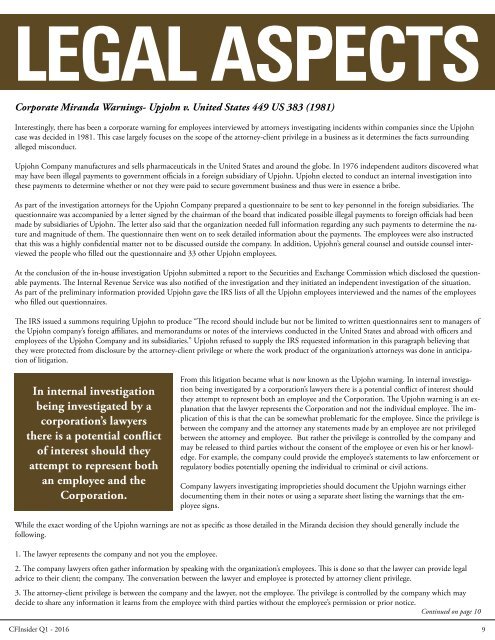A Non-Verbal Response from a Professional Politician
4n42WM
4n42WM
Create successful ePaper yourself
Turn your PDF publications into a flip-book with our unique Google optimized e-Paper software.
LEGAL ASPECTS<br />
Corporate Miranda Warnings- Upjohn v. United States 449 US 383 (1981)<br />
Interestingly, there has been a corporate warning for employees interviewed by attorneys investigating incidents within companies since the Upjohn<br />
case was decided in 1981. This case largely focuses on the scope of the attorney-client privilege in a business as it determines the facts surrounding<br />
alleged misconduct.<br />
Upjohn Company manufactures and sells pharmaceuticals in the United States and around the globe. In 1976 independent auditors discovered what<br />
may have been illegal payments to government officials in a foreign subsidiary of Upjohn. Upjohn elected to conduct an internal investigation into<br />
these payments to determine whether or not they were paid to secure government business and thus were in essence a bribe.<br />
As part of the investigation attorneys for the Upjohn Company prepared a questionnaire to be sent to key personnel in the foreign subsidiaries. The<br />
questionnaire was accompanied by a letter signed by the chairman of the board that indicated possible illegal payments to foreign officials had been<br />
made by subsidiaries of Upjohn. The letter also said that the organization needed full information regarding any such payments to determine the nature<br />
and magnitude of them. The questionnaire then went on to seek detailed information about the payments. The employees were also instructed<br />
that this was a highly confidential matter not to be discussed outside the company. In addition, Upjohn’s general counsel and outside counsel interviewed<br />
the people who filled out the questionnaire and 33 other Upjohn employees.<br />
At the conclusion of the in-house investigation Upjohn submitted a report to the Securities and Exchange Commission which disclosed the questionable<br />
payments. The Internal Revenue Service was also notified of the investigation and they initiated an independent investigation of the situation.<br />
As part of the preliminary information provided Upjohn gave the IRS lists of all the Upjohn employees interviewed and the names of the employees<br />
who filled out questionnaires.<br />
The IRS issued a summons requiring Upjohn to produce “The record should include but not be limited to written questionnaires sent to managers of<br />
the Upjohn company’s foreign affiliates, and memorandums or notes of the interviews conducted in the United States and abroad with officers and<br />
employees of the Upjohn Company and its subsidiaries.” Upjohn refused to supply the IRS requested information in this paragraph believing that<br />
they were protected <strong>from</strong> disclosure by the attorney-client privilege or where the work product of the organization’s attorneys was done in anticipation<br />
of litigation.<br />
In internal investigation<br />
being investigated by a<br />
corporation’s lawyers<br />
there is a potential conflict<br />
of interest should they<br />
attempt to represent both<br />
an employee and the<br />
Corporation.<br />
From this litigation became what is now known as the Upjohn warning. In internal investigation<br />
being investigated by a corporation’s lawyers there is a potential conflict of interest should<br />
they attempt to represent both an employee and the Corporation. The Upjohn warning is an explanation<br />
that the lawyer represents the Corporation and not the individual employee. The implication<br />
of this is that the can be somewhat problematic for the employee. Since the privilege is<br />
between the company and the attorney any statements made by an employee are not privileged<br />
between the attorney and employee. But rather the privilege is controlled by the company and<br />
may be released to third parties without the consent of the employee or even his or her knowledge.<br />
For example, the company could provide the employee’s statements to law enforcement or<br />
regulatory bodies potentially opening the individual to criminal or civil actions.<br />
Company lawyers investigating improprieties should document the Upjohn warnings either<br />
documenting them in their notes or using a separate sheet listing the warnings that the employee<br />
signs.<br />
While the exact wording of the Upjohn warnings are not as specific as those detailed in the Miranda decision they should generally include the<br />
following.<br />
1. The lawyer represents the company and not you the employee.<br />
2. The company lawyers often gather information by speaking with the organization’s employees. This is done so that the lawyer can provide legal<br />
advice to their client; the company. The conversation between the lawyer and employee is protected by attorney client privilege.<br />
3. The attorney-client privilege is between the company and the lawyer, not the employee. The privilege is controlled by the company which may<br />
decide to share any information it learns <strong>from</strong> the employee with third parties without the employee’s permission or prior notice.<br />
Continued on page 10<br />
CFInsider Q1 - 2016<br />
9


